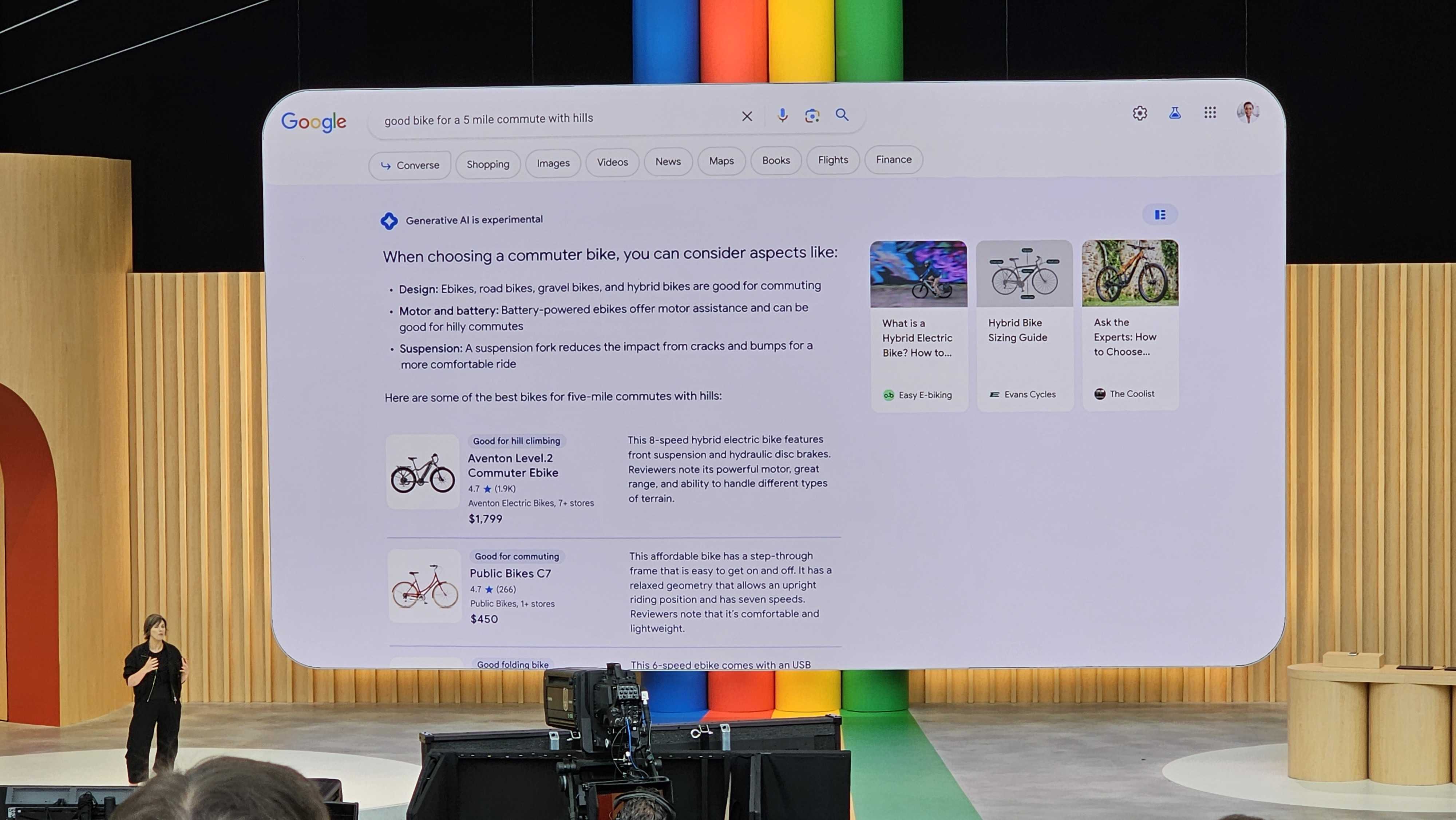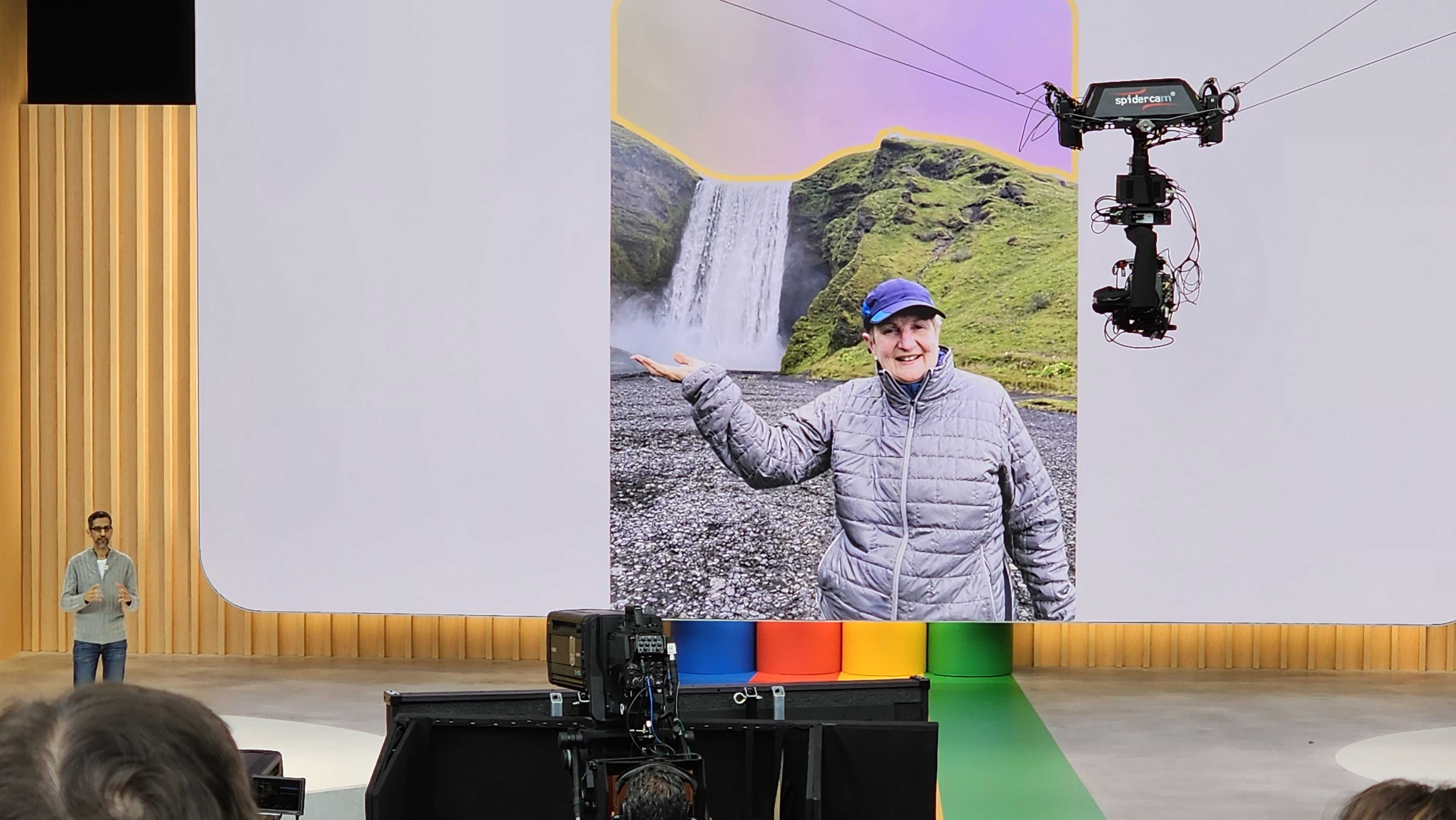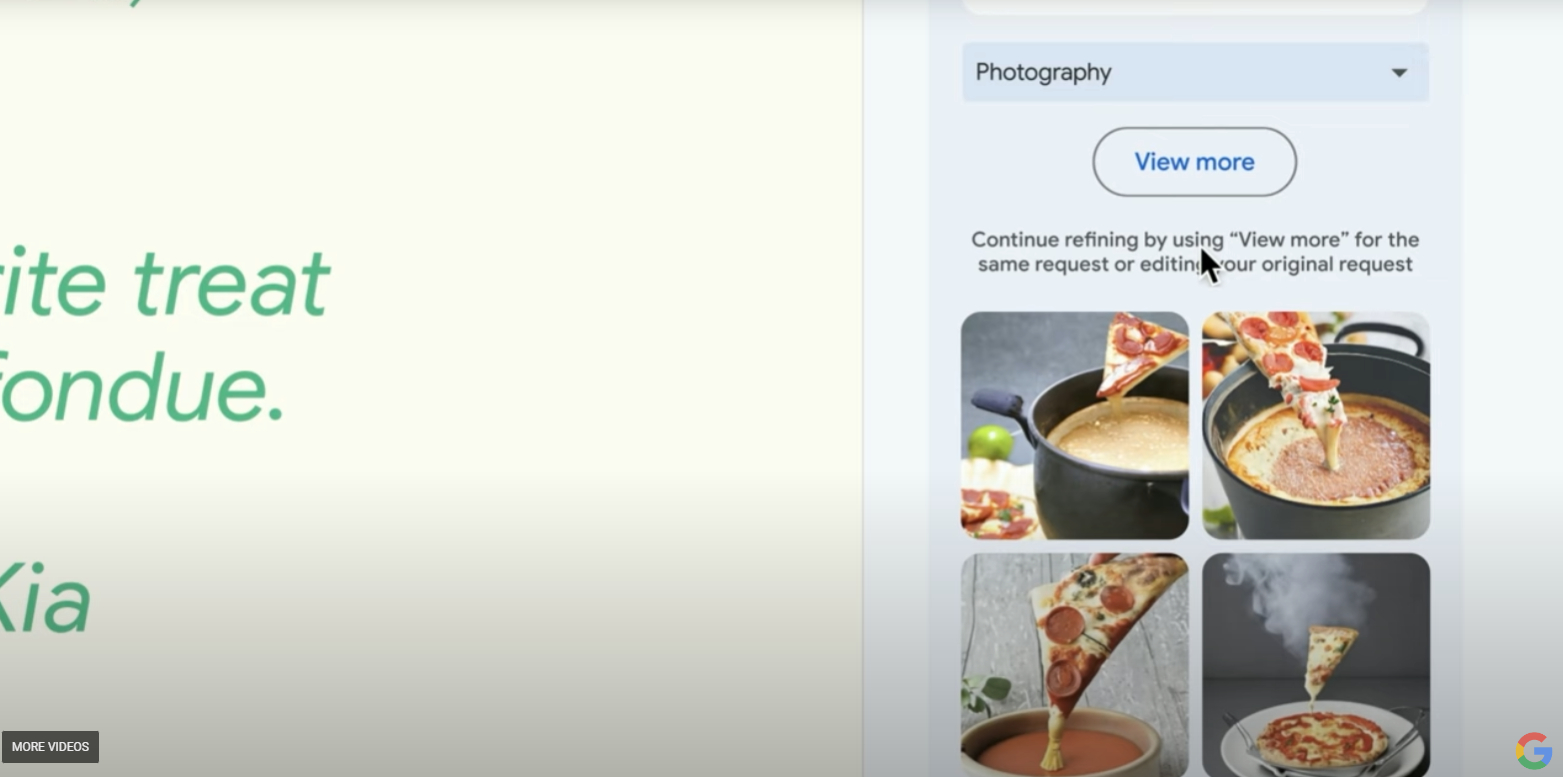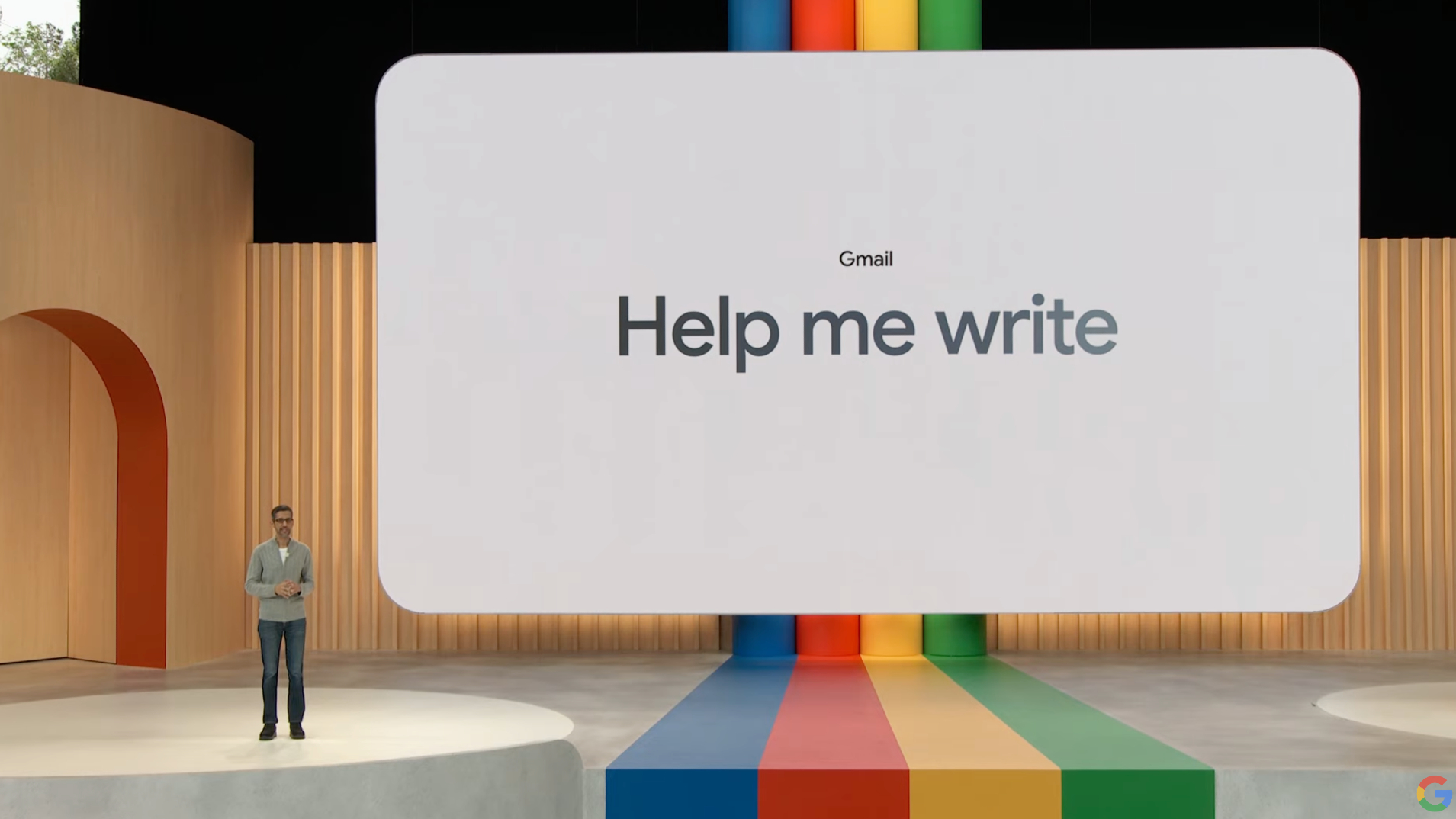Google just showed us the future of AI - and it’s incredibly mundane
One company's quest to put AI into everything

Google showed off its most comprehensive plans for the future of AI yet at the Google I/O keynote. The company's answer to the ongoing AI gold rush? Put AI integration into literally everything.
Google's I/O keynote presentation lasted two hours; one hour and a half of which was dedicated to showcasing a litany of AI integration in the brand's search engine as well as the widely-used Google Workspace apps. The other half an hour, almost as an afterthought, was dedicated to the new Google Pixel Fold, Pixel Tablet, and Pixel 7a devices. During the event I found myself oscillating between thoughts of “that’s cool” and “that’s potentially useful” to “yeah, won't be used”.
It seems that Google has adopted a see-what-sticks tactic with its AI integration, a method that's sure to lead to some useful gems but also bloatware, feature creep, and half-baked ideas that will likely end up abandoned. It's going to be interesting to see which become mainstream, and I have a strong feeling it's the more mundane additions that will make the cut in the long run.
AI is about to flood our screens

The Google I/O presentation was replete with examples of its soon-to-be ubiquitous integration with search and other Google apps. Some notable mentions included demonstrations of Google Bard’s integration into search and Google Sheets, some potentially handy generative features for emails in Gmail, and some quite frankly bonkers photo editing tricks for Google Photos. All good stuff - potentially.

There were, of course, a couple of stinkers too. One example that immediately comes to mind is a weird section where we watched a Google exec generate clipart of a pizza fondue in Google Slides - first as a cartoon, then in a photorealistic rendition. The use case here was a family photobook or... something.
Will it actually make us more productive?
Some of these tools may be fun to work with, but it's probably the more mundane and useful-out-the-box features that will stick.
Generated art is all well and good, but for me, the real question here is - how quickly will these tools actually get adopted to make us more productive in the workplace?
Integrating AI into heavily used apps like Gmail or Sheets feels like the golden ticket for productivity, but there are obviously questions about how widely it will be utilized and whether people will be able to fully harness the power of AI from the get-go. Some of these tools may be fun to work with, but it's likely the more mundane and useful-out-the-box features will stick.
When computers were first introduced into the workplace in the 70s and 80s, an odd observation was made by economists; instead of making us more productive, they actually made us less productive. This phenomenon, named the Solaw paradox after the economist who originally put forth the observation, wasn't fully resolved until a productivity boom in the early 90s.
At that time, these new-fangled computers had time to bed into the workplace and society. In today’s world, however, tools and ideas that don’t take off immediately are often thrown to the side in short order - take Zuckerberg’s metaverse for example, which has by some accounts lost Meta somewhere in the ballpark of $23 billion.
It’s probably wrong to draw an analogy between AI and the metaverse - the metaverse was never exactly the most fleshed-out idea, after all. It does, however, seem reasonable to think that some of Google’s ideas in this latest splatter-gun approach to AI integration will fall by the wayside while others have the potential to become commonplace (unlike the Metaverse, sorry Zuck).
Mundanity masks serious concerns

Google conveniently sidesteps that no one can effectively predict if these tools will take off or what the actual implications of their use are.
For the most part, Google’s litany of planned AI features was pretty mundane - especially the business-orientated stuff. In most cases, we’re likely to see AI features in the form of sidebar options - think Clippy, rather than Hal 9000.
Google was eager to showcase these tools with practical displays, often with humorous outcomes to relatable requests. The company is keen to present a friendly face for its new technology. The corporate line here is that these tools are easy to use, safe, and responsibly developed. Obviously, it’s a point they felt the need to address after one of their lead scientists retired a few weeks ago with a dire warning to the human race.
Focusing on the practical side of things, Google did try to address some ethical concerns with a part of the presentation dedicated to responsible AI. For the most part, this part of the presentation was OK - covering real issues like misinformation and output bias.
It left the most difficult questions about how AI can potentially disrupt society open, however. Sure, the pizza fondue image generation feature isn't likely to put artists out of a job any time soon, but economists have already raised concerns about the long-term impact of AI on human society and economies. To say the least, many are unsettled about the near-monopoly large corporations currently hold over the development of AI, and quite rightly so.
By focusing on things like ethical output, Google can conveniently sidestep the fact that no one can effectively predict if these tools will take off or not - or what the actual implications of their use are. For the most part, it’s likely that some of these features will be forgotten quickly or underutilized by the majority of people, but there could be one or two that make the difference - even if they are wrapped up in a veil of mundanity.
Get daily insight, inspiration and deals in your inbox
Sign up for breaking news, reviews, opinion, top tech deals, and more.

Alex is TechRadar's deals editor, specializing in getting our readers the best bang for the buck on the tech that we know and love. He's a dab hand at covering retailer events like Black Friday and Amazon Prime Day having over seven years of e-commerce experience at Future PLC; including bylines at our sister sites T3 and GamesRadar. Alex's expertise touches on most areas of TechRadar but he has a particular love for phones, laptops, and cameras, being an avid photographer. Outside of work, you'll find him indulging his love for street and travel photography, at home working on music, or down at the local climbing gym.